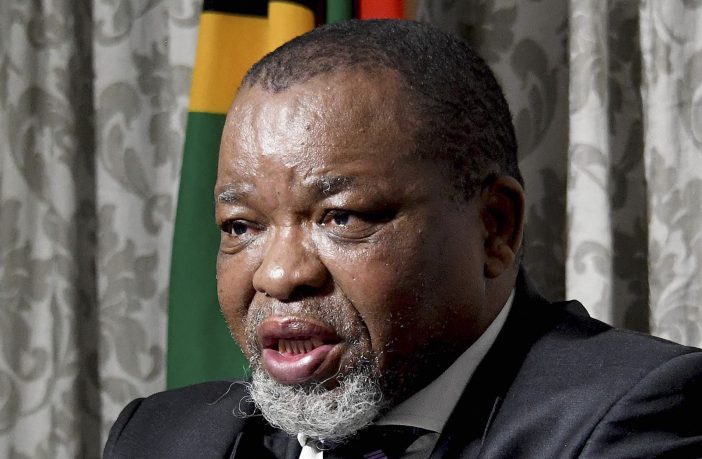Opinion
Journalists and commentators who brave the ANC’s national conference to get a more granular sense of what is going down must face a professional dilemma when they are finally permitted into an open session in the vast plenary hall.
If they choose to take a seat in the media section, it is relatively comfortable but very far from the action, positioned as it is about 50m directly to the right of the podium. You can’t see those on the stage, except via the huge video screens. So you might as well be at home watching it on TV from the comfort of your couch.
Most of the media take the other option. Which is to crouch or sit on the narrow corridor of floor between the podium and the front row of the delegates. Part Spanish bullring, part Roman lion’s den and part World War I trench, it is an extraordinary and even exhilarating experience.
Blood and thunder; a political cacophony. In their wisdom, the organising committee had opted to place the KwaZulu-Natal delegation right in front of the section of the podium where the speaker’s stand was located.
It’s someone’s job to try to chair this enormous and unruly gathering. And in December, that man was Gwede Mantashe – the now re-elected chair of the ANC. As one peers up at the man, one’s admiration for him inevitably grows. The baying from the KZN ranks rises; with numerous shouted demands and insults.
It’s a thankless task, but Mantashe has the skin of a rhino, and he manages the process with aplomb, without once breaking a sweat or looking remotely disconcerted. Despite the pressure, there is no evidence of his heartbeat rising one beat. He has nerves of steel.
But this man is also the minister of mineral resources and energy. And he likes his job, recognises its power, and wants to stay overlording the most important (and ripe with potential) – and troubled – sector of South Africa’s economy.
On Monday, he was centre-stage again, at the mining indaba, surrounded by “fat-cat mining magnates” and “masters-of-the-universe asset managers”, and utterly in his element.
But this rhino-skinned former National Union of Mineworkers general secretary can be as clumsy as a bull in a China shop. This, in so many words, is what the Western Cape High Court found recently, in an important judgment late last month.
Related news: Court rules that Mantashe’s axing of nuclear board member, Peter Becker, was unconstitutional
The relevant factual background can be simply stated. South Africa’s nuclear energy industry is regulated by the National Nuclear Regulator and governed by the National Nuclear Regulator Act, 1999. The act requires that the regulator have a board and that the board include “one person representing communities, which may be affected by nuclear activities”.
This legal requirement was flouted for almost a year, from August 2020 until the appointment on 10 June 2021 of Peter Becker, a well-known anti-nuclear activist, who before his appointment to the board was serving as spokesperson for the Koeberg Alert Alliance, a local activist group set up to monitor the Koeberg nuclear power station near Cape Town.
Between his appointment and his first board meeting on 30 July 2021, a number of things happened that irked some members of the board and led, ultimately, to Mantashe’s decision to dismiss him from the board on 25 February 2022 (having first suspended him on 18 January) on the grounds of misconduct.
As the high court stated: “In essence, the Minister discharged him on the basis that he had a conflict of interests which arose from him having expressed critical views concerning the desirability of nuclear energy.”
Koeberg safety concerns
Soon after his appointment to the board, Becker was quoted in an article in Energize magazine on 30 June. Unsurprisingly, when asked about issues of safety and sustainability, Becker offered the view he had long held, raising a number of serious concerns.
He was quoted as saying that “we should be worrying about the safety of the existing plant at Koeberg, especially as it approaches the end of its design lifetime”. He was concerned that there are several issues that need to be addressed before the Koeberg plant can be considered safe by modern standards and that will come with a “significant cost”, and “much like an older car, there comes a time where it is just not worth repairing it to the point where it is as safe as a new car, it was unwise to spend money refurbishing a plant before finding out what would have to be done to obtain a licence to extend its life”.
It would have been peculiar if Becker had not presented this perspective: his views on the matter, which were well known by Mantashe when he appointed him, as the minister was forced to admit during the litigation, were not changed simply because he had been appointed to the board of the regulator.
As Speaker of the first democratic parliament, Frene Ginwala, who died last month, once said when asked why she had not resigned the ANC whip after having been elected Speaker: “I can resign the whip but it would be pointless. I am ANC through and through, and nothing will change that. The question is whether I can be independent of mind, and impartial in exercising my responsibilities as Speaker.”
A similar point can be made of Becker, although Mantashe’s decision to remove him denied him the opportunity to prove his independence as a board member.
And, having been told in his board induction that he could request information from staff, Becker had, during a meeting of a board’s technical subcommittee on 15 July, sought access to two documents that included information about concerns over safety drill practices at Koeberg.
Then, on 22 July, Becker convened a consultative meeting with a group of civil society organisations to collect their concerns about safety at Koeberg, doing what, one might reasonably presume, any person appointed to a board as a community representative might do.
But not according to Mantashe, who took umbrage at Becker’s positioning and after some to-ing and fro-ing between lawyers on both sides, decided to rid himself of the troublesome activist – what the court later held to be a sham process procedurally, as Mantashe had already shown his hand when in a TV interview on 3 February with Newzroom Afrika, about three weeks before his final decision to dismiss Becker, he argued defiantly that “it is simple, you are an anti-nuclear activist, you can’t sit on the Board of nuclear, and get all the details of the plans and go and plan a programme against that entity. It is not allowed” – a pre-judgment that the court later held to be both shocking and evidence of Mantashe’s “bad faith and ulterior motives”.
Later, in May, Mantashe doubled down on this line, when he was publicly quoted as saying: “If you resist nuclear and you [are]a board member, I fire you, simple. You can’t be in a board of something you’re not advocating for.”
In a subsequent affidavit, Mantashe offered the view that: “The publicly expressed views of Mr Becker concerning desirability [of nuclear power]are said to be a ‘contagion’ that would ‘infect’ the Board’s decision-making”. This was a notion the court later held to be “fanciful”.
Represented by distinguished veteran public lawyer Geoff Budlender SC, Becker decided to judicially review Mantashe’s decision on the basis that it was vitiated by multiple material irregularities, irrationality, unreasonableness and unlawfulness.
Becker prevailed. The court held that Mantashe acted unlawfully and unconstitutionally, and, in failing to consult the community before reaching his decision to dismiss Becker, acted irrationally.
In a well-composed and coherent judgment, Judge Babalwa Mantame held that the statements made in public, the request for information from the regulator’s employees and the meeting with the members of his constituency could not be construed as misconduct to justify dismissal under the act. “Even if there was a perception of conflict of interest”, Judge Mantame wrote, “in my view, it was capable of being mitigated. It then follows that a sanction of discharge is unsustainable”.
‘Boggles one’s mind’
The case raises important issues about the role of the board in leading and governing an organisation and about the role of individual board members.
Although, since it was impermissibly raised as an additional ground of misconduct to justify the dismissal, it was not relevant to the main reasoning in the judgment. The court observed, regarding Mantashe’s argument that Becker should have recused himself from decisions and discussions concerning the extension of Koeberg’s lifespan: “[It] boggles one’s mind why Mr Becker’s input on the Board should be sanctioned, even before such discussions are tabled for discussion. Instead, the Board should have considered themselves fortunate to have a representative who represents communities affected by nuclear activities. Their input should have enlightened the Board since it would have brought a different perspective to their discussions other than the government policy that was referred to by the Minister. Much to this Court’s dismay, in a Board consisting of twelve (12) members it is not clear how Mr Becker’s only opinion could have swayed all other members to his direction, unless his reasons are valid… In my view, having Mr Becker on the Board should have enhanced the Board and brought fresh and robust ideas on the table for discussion.”
Adopting the approach of the International Organization for Standardization’s new standard on governance (ISO37000), the responsibility of the governing body – the board – is to “direct, oversee and be accountable for achieving the defined purpose of the organisation in an ethical and responsible fashion”.
The legal purpose of the nuclear regulator is first and foremost to provide for the protection of people affected by nuclear energy activities and to exercise regulatory control over safety.
It’s a hugely important responsibility. Get it wrong and it has dire and deadly consequences; one need look no further than the ghastly accident at Japan’s Fukushima nuclear power station in 2011 to grasp this.
What the high court’s decision helps us understand is just how vital it is to have countervailing views and voices on a board, to help ensure that “groupthink” is avoided.
Mantashe failed to appreciate this; he wanted a bunch of yes-men to ease the path for more, not less, nuclear power. Becker was a thorn in his side and despite all of Mantashe’s tired revolutionary rhetoric about “our people”, he could not tolerate a community representative with opposing views.
Mantashe acted unlawfully, but feebly. Using your authority to get rid of someone whose views are inconvenient is not an act of power or strength, but the reverse.
Mantashe is a formidable politician, there is no doubt about that. But he is also not only clumsy but, as his critics said of him following his robust defence of Cyril Ramaphosa in December, also something of a bully.
That famously thick skin can be an asset or a liability. In the case of Peter Becker, Mantashe showed his true colours.
Author: Richard Calland
Richard Calland is an academic in public law and leadership. He is also a founding oartner of political economy consultancy The Paternoster Group: African Political Insight.
Disclaimer: The articles and videos expressed in this publication are those of the authors. They do not purport to reflect the opinions or views of Green Building Africa, our staff or our advertisers. The designations employed in this publication and the presentation of material therein do not imply the expression of any opinion whatsoever on the part Green Building Africa concerning the legal status of any country, area or territory or of its authorities.














